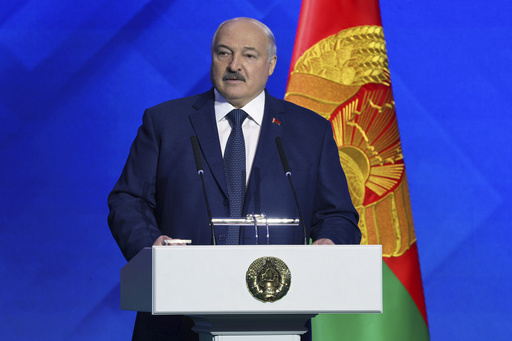
TALLINN, Estonia — On Monday, Belarus’ election commission authorized seven politicians aligned with President Alexander Lukashenko to begin gathering signatures to challenge him in the upcoming January election, a move that appears to be an attempt to present a facade of competition against the long-serving authoritarian leader.
Lukashenko, who has been at the helm for over three decades, is campaigning for his seventh term amid a harsh ongoing crackdown on opposition forces and independent media. The election is set for January 26 and follows 4.5 years after the disputed 2020 presidential election, which was denounced by both opposition groups and Western nations as fraudulent, igniting widespread protests across the nation. In response, the government undertook a significant crackdown on dissent, leading to approximately 65,000 arrests.
Many prominent opposition leaders either found themselves imprisoned or were forced to flee the country amidst this repression. Human rights organizations now estimate that around 1,300 political prisoners are currently in Belarus, many reportedly lacking proper medical treatment and communication with their families.
Lukashenko has managed to maintain his grip on power through heavy subsidies and political backing from ally Russia, which he allowed to utilize Belarusian territory for military operations in Ukraine beginning in February 2022.
The Central Election Commission of Belarus registered a group last week for Lukashenko as he prepares for the election. The commission’s recent decision permitted the aforementioned seven politicians, including Sergei Syrankov of the Communist Party, Oleg Gaidukevich from the Liberal Democratic Party, and former Interior Ministry spokesperson Olga Chemodanova, to start gathering signatures.
Lukashenko characterized these candidates as mere alternatives, suggesting their primary function is to protect his position. Each of these individuals must collect no fewer than 100,000 signatures by December 6 to qualify for the election.
However, the commission previously denied registration to initiative groups for two opposition politicians attempting to enter the race. Independent analyst Valery Karbalevich remarked, “There are candidates, but no real competition in this election,” emphasizing that Lukashenko remains fearful of a resurgence of protests similar to those seen in 2020, which have left a lingering impact on his approach.
Sviatlana Tsikhanouskaya, who has sought refuge after contesting Lukashenko during the 2020 election, vehemently criticized the impending vote, describing it as a facade. She encouraged Belarusians to vote against all candidates participating in the election. “We propose that the people express their dissent by voting against those who are stripping us of our electoral rights,” stated Tsikhanouskaya. She highlighted the injustice faced by her husband, Siarhei Tsikhanouski, who is currently serving a lengthy prison sentence after his attempt to challenge Lukashenko. “This is not an election but an imitation of the electoral process occurring under an atmosphere of fear where alternative candidates and observers are not permitted.”
In previous elections held in February for parliamentary and local seats, only candidates loyal to Lukashenko were allowed to participate. Furthermore, for the first time, Belarus did not invite observers from the Organization for Security and Cooperation in Europe to oversee these electoral events.
